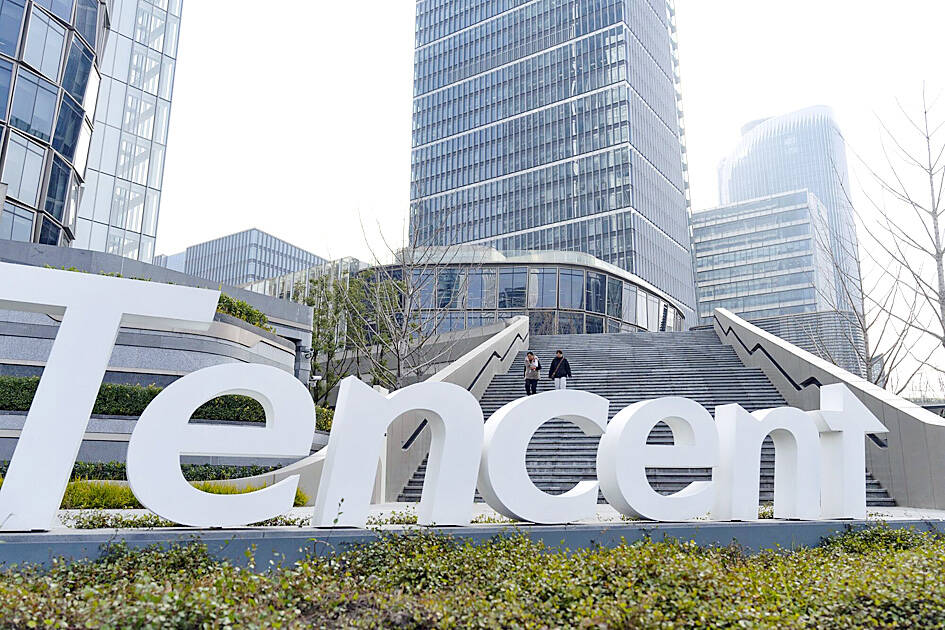Tencent Holdings Ltd (騰訊) said yesterday its Weixin messaging app, China’s largest, is allowing some users to search via DeepSeek’s (深度求索) artificial intelligence (AI) model, as firms race to link up with the AI start-up that has grabbed global attention.
In a beta test, Weixin is testing access to DeepSeek for searches, Tencent said in an e-mailed statement to Reuters.
The move by the Chinese tech giant is notable as integrating DeepSeek brings in an external AI platform, while tech firms compete fiercely in developing the most advanced AI.

Photo: Qilai Shen, Bloomberg
Weixin uses Tencent’s proprietary Hunyuan-Large language model to enrich its AI search, a spokesperson said.
Tencent is exploring the integration of multiple products with DeepSeek, including Tencent Cloud AI Code Assistant and Tencent Yuanbao, another AI assistant app, a person with knowledge of the matter said.
DeepSeek is being tested by Weixin, which serves domestic users, not its sister app WeChat, which targets overseas users. The two had a combined 1.38 billion users at the end of September last year.
DeepSeek last month upended the AI world, launching a free AI assistant that it says uses less data at a fraction of the cost of incumbent services. It quickly overtook US rival ChatGPT in downloads from Apple Inc’s App Store.
Among Chinese companies seeking to capitalize on DeepSeek’s potential breakthrough, automaker Great Wall Motor Co (長城汽車) and leading telecoms providers are integrating the AI model released by DeepSeek into their offerings.
In related news, Elon Musk’s AI start-up xAI is to release its Grok 3 chatbot today, with the billionaire describing it as the “smartest AI on Earth,” the Tesla Inc CEO said in a post on X.
Musk teased the planned launch of Grok 3 chatbot during a video conference at the World Government Summit in Dubai on Thursday, calling it an AI model that would outperform every competing tool that’s been released so far.
The model was trained on synthetic data and is capable of reflecting on mistakes that it makes by going back and forth through the data to achieve logical consistency, Musk said.
Additional reporting by Bloomberg

Sweeping policy changes under US Secretary of Health and Human Services Robert F. Kennedy Jr are having a chilling effect on vaccine makers as anti-vaccine rhetoric has turned into concrete changes in inoculation schedules and recommendations, investors and executives said. The administration of US President Donald Trump has in the past year upended vaccine recommendations, with the country last month ending its longstanding guidance that all children receive inoculations against flu, hepatitis A and other diseases. The unprecedented changes have led to diminished vaccine usage, hurt the investment case for some biotechs, and created a drag that would likely dent revenues and

Macronix International Co (旺宏), the world’s biggest NOR flash memory supplier, yesterday said it would spend NT$22 billion (US$699.1 million) on capacity expansion this year to increase its production of mid-to-low-density memory chips as the world’s major memorychip suppliers are phasing out the market. The company said its planned capital expenditures are about 11 times higher than the NT$1.8 billion it spent on new facilities and equipment last year. A majority of this year’s outlay would be allocated to step up capacity of multi-level cell (MLC) NAND flash memory chips, which are used in embedded multimedia cards (eMMC), a managed

CULPRITS: Factors that affected the slip included falling global crude oil prices, wait-and-see consumer attitudes due to US tariffs and a different Lunar New Year holiday schedule Taiwan’s retail sales ended a nine-year growth streak last year, slipping 0.2 percent from a year earlier as uncertainty over US tariff policies affected demand for durable goods, data released on Friday by the Ministry of Economic Affairs showed. Last year’s retail sales totaled NT$4.84 trillion (US$153.27 billion), down about NT$9.5 billion, or 0.2 percent, from 2024. Despite the decline, the figure was still the second-highest annual sales total on record. Ministry statistics department deputy head Chen Yu-fang (陳玉芳) said sales of cars, motorcycles and related products, which accounted for 17.4 percent of total retail rales last year, fell NT$68.1 billion, or

In the wake of strong global demand for AI applications, Taiwan’s export-oriented economy accelerated with the composite index of economic indicators flashing the first “red” light in December for one year, indicating the economy is in booming mode, the National Development Council (NDC) said yesterday. Moreover, the index of leading indicators, which gauges the potential state of the economy over the next six months, also moved higher in December amid growing optimism over the outlook, the NDC said. In December, the index of economic indicators rose one point from a month earlier to 38, at the lower end of the “red” light.